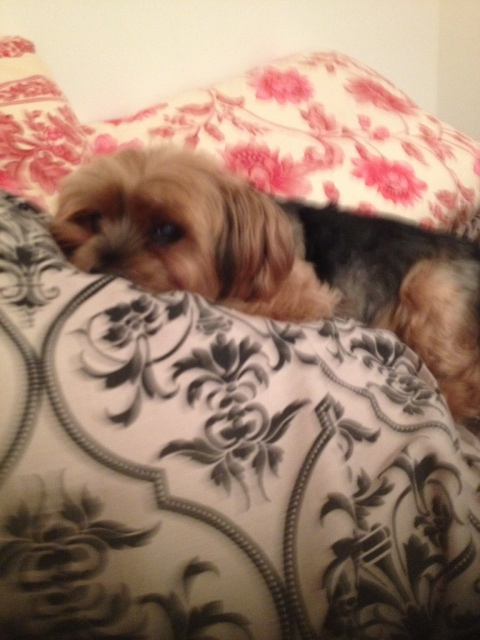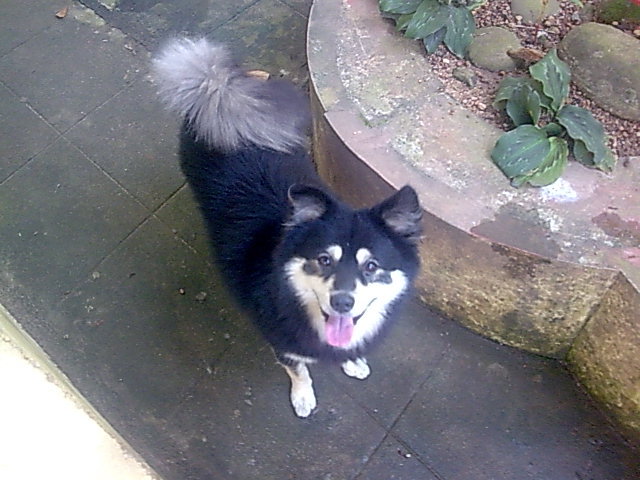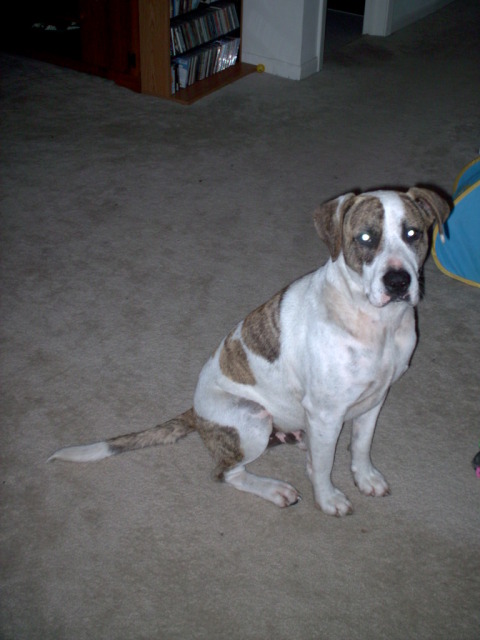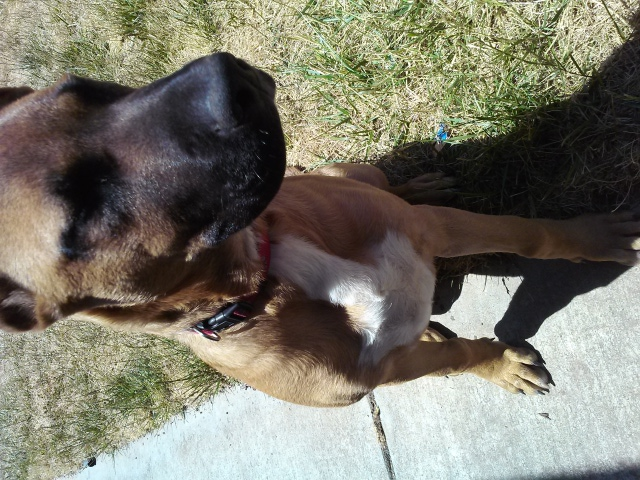QuestionI am a dog foster home for a local rescue group. Yesterday I picked up a 3-4 yr old Lhasa, whose owner died. Apparently she didn't take the dog out for at least the last 10 days of her life because of health problems. Before that time the owner was not known to be a good housekeeper. Anyway, I didn't know this when I picked her up. I brought her home, she seemed to make herself at home laying in my bed. A little while later, she both pooped and peed in the bed. I chalked this up to her being traumatized by what happened to her, losing her owner and home. We took her outside in the fenced area which she wanted no part of, she doesn't seem to like grass. We walked and walked her, she did not potty. She came back in the house and peed on the bed again and pooped on the floor. Later,my husband walked her, and she peed on the road. We crated her last night and took her out this morning, she both pooped and peed on the road. I later took her for a couple of walks, she still won't do anything in the grass and usually won't go at all. Later the little devil again jumped up in my bed (I didn't think she could since I moved the steps away) and peed in the bed. Now I will keep the door to the room closed! Ok - how do I get her to stop going to the bathroom in the house, and how do I get her to start using the grass? Any help you can give will be great. I am thinking she must have gone to the bathroom on her ex-owners bed.
AnswerHi Sandy,
Thanks for choosing me to answer your question at AllExperts!
As a fosterer for a local rescue, you're probably already aware that dogs not only can take a while to adjust to their foster homes, and that dogs that were neglected to ill health of their prior owners or for other reasons may come with special needs, such as needing to be housetrained.
I would suggest treating this Lhasa as a young pup and assume the dog has never been properly housetrained. It's likely that the owner's health has been failing for quite a while and, while she may have intended to take better care of the needs of her dog, her dog may have been her only comfort and she kept him although unable to properly care for him. It's hard to know for sure, so let me give you some suggestions for housetraining your new charge.
It bodes well that your new charge has opted to eliminate outside on a hard surface. That means that when she does, you have the opportunity to verbally praise her and offer her a treat right after she eliminates appropriately. It sounds as if she has two substrate preferences - soft places, like beds; and hard places outside such as hardtop. It sounds as if it's possible she was curbed when she was able to eliminate outside under the care of her former owner. Somehow she developed a preference for hard surfaces out of doors, and these preferences are developed very early in a dog's life.
First, let me suggest that you either crate her or section off an area for her to remain at night where she doesn't have access to your bed and to rugs or furniture in your home. The area should have a sleeping area for her and enough room for her to move around a little and stretch out fully, as well as stand up fully with at least three inches of head clearance. Ex-pens also work well, as long as the dog can't jump over them, escape from them otherwise, and isn't wearing any equipment that can get caught on any part of the ex-pen, or crate for that matter.
Second, establish a consistent schedule for her. She should go out first thing in the morning, upon her waking you (not the other way around). If she whines, paces, scratches or otherwise makes stirring noises in the morning, take her right out and do not pass 'Go.' Since she's small, and if she'll allow it right now, pick her up and put her down to potty only once she's outside.
When she potties outside, right after she's finished (not during, otherwise you may inadvertently interrupt), reward her highly with verbal praise and with a food treat, something she likes, and you may need to experiment a little to find out what this may be. Most dogs like small bits of cheese, plain yogurt, peanut butter, small pieces of low sodium hot dogs, or good quality store bought treats. Even a bit of her own dog food might work well.
If she doesn't potty after about 10 minutes, give her breakfast, a bit of water, and take her out within five minutes after she's eaten her meal for about 20 minutes. Walk her around, but don't exercise her strenuously after she's eaten and drunk water. With success, praise and reward. If there's no success, confine her again for 10 minutes while keeping an eye on her to see whether she looks as if she needs to potty (pacing, sniffing, distracted, squatting) and then whisk her out for another 10 minutes. Any time she's successful, praise and reward. Now, this is important: once she potties, do NOT bring her right in as this could be viewed by her as punishment and the end to her outdoor fun, and she could decide to delay pottying. Instead, spend a few minutes out of doors playing tug with her or some other game she likes, or simply teaching her to sit and wait on leash.
When she's successful, give her 15 to 30 minutes of supervised play time with you once you take her indoors. Afterwards, confine her again or keep her leash attached to you so you can keep an eye on her, and walk her every two hours. Success always equals reward. Non-success means try again in 10 minutes as described above.
Dogs need to be walked:
First thing in the morning;
After they've just woken up from the night or from a nap during the day;
Generally within five to 30 minutes after they've eaten or drunk water (you will get to know your dog's routine over the next couple of weeks);
After playing;
After training and their mind has been stimulated;
After more strenuous exercise, such as running, fetching, or swimming;
Last thing at night before you go to bed;
Every couple of hours if the dog has not been housetrained; and,
More often when any change might be stressful for the dog.
If you find you need additional help, it may be a good idea to hire a positive methods trainer to spend a couple of hours with you giving you some additional, hands-on tips.
The most important thing for her right now is consistency and patience. If you work during the week, it may be a good idea to start her new routine over the week-end. For at least a couple of weeks if you work it may be a good idea to have a walker come in so that a routine can be established and maintained.
Confining dogs as described above generally works well because most dogs don't want to soil in a small area where they sleep and also eat their food; so, feed her her meals in the confined area for now. It's also easier to supervise a dog when they're confined to a smaller area or if their leash is attached to you. With her leash attached, make sure she has enough room to get out of your way when you walk, and enough room to sit and lie down comfortably without tension on the leash, even while you're standing. Generally a six-foot long leash works well, and perhaps a longer one if you're on the tall side.
If you're unable to hire a walker and can't be home frequently enough, then you must provide a place in her confined area that will allow her to potty when she needs to. Because she's confusing your bed with her potty area indoors, I would suggest NOT using anything that's too soft, like wee pads. Instead, try using a couple of layers of newspaper away from her sleeping area and away from her food and water in her confined area which will feel different than her sleeping area, but also different from your bed. You may also use baby gates to confine her to a small section of a room or a hallway. In general, for small dogs, an area of about 6' x 6' works well.
For now, I would not allow her on the bed, or other soft places like the sofa, until you feel she's learned that she's to eliminate out of doors consistently.
As she starts being able to hold it for longer periods indoors, you can gradually increase the time between walks, perhaps 15 minutes at a time. When properly house trained, a dog of three years of age should be able to wait six or seven hours until the next potty break, and generally a little longer through the night if there are no medical issues affecting elimination. Just move along gradually, be vigilant, and give her lots of praise when she potties out of doors. Realize that because of her age and her past experiences, she may take a little longer to house train than a pup might take, perhaps even a few months; but eventually she will understand what you want from her.
Please update in a few weeks and let me know how it's going.
Hope these suggestions help!
Best regards,
Madeline Friedman, M.A. at AllExperts
www.ny-njDogTrainer.com
Innovative Reality Dog Training & Behavior Consulting

 Cant afford medical care for my yorkie
Question
Mr. Bojangles BoBo
Hi, I adopted
Cant afford medical care for my yorkie
Question
Mr. Bojangles BoBo
Hi, I adopted
 pooping and peeing
Question
snoopy
hi, my name is praveen n i have a dog t
pooping and peeing
Question
snoopy
hi, my name is praveen n i have a dog t
 7 week old lurcher pup
Question
this is Lady
hi there me and my partner purch
7 week old lurcher pup
Question
this is Lady
hi there me and my partner purch
 dog jumping fence
Question
dog
I have a 3 year old Staffordshire/Lab that
dog jumping fence
Question
dog
I have a 3 year old Staffordshire/Lab that
 dog breed unknown
Question
dog breed unknown dog breed unknown &nbs
dog breed unknown
Question
dog breed unknown dog breed unknown &nbs